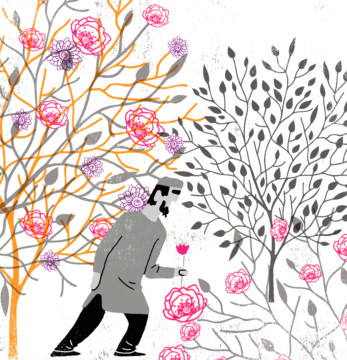
In Nadeem Aslam’s memorable 2008 novel “The Wasted Vigil”, set in Afghanistan, beauty and pain were intimately entwined, impossible to keep apart. The various incompatibles in his new book “The Blind Man’s Garden” don’t surrender their separateness so magically. There are awkward gaps and residues despite the author’s great gifts of imagination.
The novel starts in late 2001 and takes place largely in Pakistan, though some sections are again set in Afghanistan, newly invaded. Elderly Rohan, eventually the blind man of the title, his vision gradually dimming, founded an Islamic school called Ardent Spirit with his wife Sofia. After her death he was forced out as the school became intolerant, a virtual nursery of jihad, but continues to live in the house that he built on the same site.
The main characters of “The Wasted Vigil” were non-natives, a Briton, an American and a Russian (partial roll call of the nationalities that have meddled in Afghanistan). There are no such mediating figures in the new novel, and they are missed. No doubt imperialistic reading habits die hard, the easy expectation of having otherness served up on a plate, but it is not just that. For Aslam to communicate the richness and depth of his characters’ culture, he must keep touching on the background they take for granted, in passages that float free of their points of view. He informs us, for instance, that orphaned children are likely to be sought out and asked to say prayers, since they belong to a category of being whose requests Allah never ignores, and that the Angel of Death is said to have no ears, to prevent him from hearing anyone’s pleas. When there is a reference to mountains near Peshawar being “higher than the Alps placed onto the Pyrenees”, the European frame of reference is jarring.
Before the main characters are properly introduced a minor figure administers a distracting overdose of symbolism. A “bird pardoner” sets up snares in the trees of Rohan’s garden, trapping the birds in nooses of steel wire. He plans to sell them in the town, since freed birds say prayers on behalf of those who buy their freedom. He doesn’t come back, though, at the promised time, and the trees are full of suffering birds.
Another minor character is a mendicant who goes around wrapped in hundreds of chains. The idea is that each link represents a prayer, and disappears as Allah grants it. The book also contains a ruby that appears without explanation, just in time to ransom a prisoner from a warlord, though the warlord, taking offence at a lack of respect during the ransoming process, pulverises the jewel and uses it as an instrument of torture instead.
For most of the book Aslam’s command of detail is absolute, but there are some strange failures early on. A page-long description of dozens of horses bursting out of the ground (they had been buried alive by Rohan’s great-grandfather to prevent them being taken by rebels during the Indian Mutiny) is visually incoherent, and even some modern details seem very unreal — such as streams with dozens of beards floating in them, shaved off by fleeing Al Qaida militants.
All of this seems to suggest the winsome irrationality of magical realism. In time, magical realism may be seen as a self-imposed variant of orientalism, complicit in the exotic expectations of outsiders. We are given to understand that when it comes to certain countries, certain cultures, the truth is incredible and, conversely, the unbelievable must be true. This isn’t at all what Aslam wants to do, which is (at a guess) to dissolve the false opposition between reason and wonder, and the presence of these elements is all the more puzzling.
The book has a plot that converges a number of times on the action-adventure thriller, though containing more pain than the genre allows. Unprotected by the gorgeousness of Aslam’s language, the story is potentially novelettish or TV film-like: two foster brothers (Rohan’s son and a boy raised with him) in love with the same woman run away to war. The details here are infinitely more convincing — though I don’t know for a fact that a .22 bullet, used to replace the fuse in a van’s headlights, will overheat and be fired into the driver’s leg after about 15 miles (24 kilometres).
The balance between these grim adventures and the life of the family waiting in anguish just about holds, though Rohan’s daughter Yasmin is an oddly sketchy presence, introduced late and never emerging as a character in her own right. This is unfortunate since the marginalisation of women, as demonstrated by “a framed family tree that displays only the names of the males”, is a theme of this novel as well as its predecessor.
Though Rohan represents devout but enlightened Islam, there are contradictions in him that the book skips over. Sofia told him she had lost her belief before she died, and he is supposed to have withheld her medication so as to force her to reconsider, such was his fear of her damnation. Students from Ardent Spirit patrol the graveyard, preventing women from visiting their dead relatives (something they have decided is forbidden), but we are not given Rohan’s reaction to this as he exercises his own uncontested visiting rights. In the quarrel over the school he had been promised that there would be no militant teaching, but that was because he was regarded as an infidel and therefore someone to whom promises could be broken. It isn’t clear whether he objects to this principle or just to being classified as an infidel. At moments such as these “The Blind Man’s Garden” seems not so much to embrace pain, as “The Wasted Vigil” did so powerfully, as to shy away from discomfort.
–Guardian News & Media Ltd


